常见动词及动词短语用法
英语动词的用法归纳总结

英语动词的用法归纳总结动词是英语语法中的一个重要部分,它用于表示一个人、物或事物所做的动作、行为或状态。
下面是几种常见的英语动词用法的总结:1. 及物动词(Transitive verbs):表示动作的动词后面可以接一个宾语,宾语接在动词的后面,它们之间有直接的关系。
例如:I kicked the ball.(我踢了球。
)2. 不及物动词(Intransitive verbs):表示动作的动词后面没有宾语,它们自己就是整个谓语,不需要补充其他成分。
例如:He sleeps.(他睡觉。
)3. 联系动词(Linking verbs):用于连接主语和主语的补足语,对主语进行描述或指示。
常见的连接动词有be(是、在)、seem(似乎)、become(变成)等。
例如:He is a teacher.(他是一名教师。
)4. 助动词(Auxiliary verbs):帮助其他动词构成时态、语态和情态的动词。
常见的助动词有be、do、have等。
例如:Heis studying.(他正在学习。
)5. 情态动词(Modal verbs):用于表示说话人对某个行为或状态的看法、推测、建议、许可等。
常见的情态动词有can、could、may、might等。
例如:I can swim.(我会游泳。
)6. 及物动词+副词(Phrasal verbs):由一个动词和一个副词组成的短语,表示特定的意义。
例如:She turned up the volume.(她调高了音量。
)7. 不及物动词+介词(Prepositional verbs):由一个动词和一个介词组成的短语,表示特定的意义。
例如:He insisted on going.(他坚持要去。
)8. 及物动词+宾补(Transitive verbs with object complements):动词之后有一个宾语和一个宾补,它对宾语进行进一步的描述或说明。
例如:They named the baby John.(他们给宝宝起名叫约翰。
动词分类及动词短语课件

3.must和have to (1)must 意为“必须,应该,一定,准是〞,表示说话人认
为 有必要做某事,或命令、要求别人做某事以及对事物的肯 定推测。如: He must be working in his office. 他一定在办公室工作。 (2)must 和 have to 的区别: must 表示说话人的主观意 愿;have to 表示客观需要。如: I must do my homework first. 我必须首先做家庭作业。 It is raining hard outside. I have to stay at home. 外面雨下得很大。我不得不待在家里。
B. may; Might
C. can; Could
D. shall; Should
( B )4. —I think her dress comes from the 1970s.
—It ________ be from that time. It looks so modern
on her.
A. mustn't
精品PPT
2 系动词 系动词亦称连系动词。系动词本身有词义,但不能单独
用作谓语,后边必须跟表语,构成系表结构。具体分类及用 法如下:
1.状态系动词: 只有be动词。如: They are always very happy. 他们总是很快乐。
2.持续系动词: 表示主语继续或保持一种状况或态度, 主
3.动词+副词+介词: 常见的有look down upon, get on with, catch up with等。如: If you study hard, you'll catch up with your classmates. 如果你努力学习, 你将能赶上你的同班同学。
常见的动词短语及例句

常见的动词短语及例句一、动词be构成的短语动词1、be known as/be famous as作为...而闻名be known for因..而出名be known to为...所知be known by凭..而知eg: The hill is known for the temple.Lu Xun is known to us as a writer.One can be known by his words and deeds. 2、be married t与....结女昏She is married to a musician.3、be tired of/with对....厌烦He is tired of/with this kind of life.=He is bored with this kind of life.He is terrified at the snake.5、be burdened with负重He is burdened with a heavy load.6、be crowed with挤满The shop is crowed with people.7、be dressed in衣着She is dressed in red.8、be experienced in对...有经历He is experienced in mending bikes.9、be equipped with装备They are equipped with guns and foods.10、be furnished with提供,布置They are furnished with enough food.11、be engaged in sth.从事,忙于=be busy with sth.He has been engaged in writing novels.12、be engaged to与..订亲My daughter is engaged to a nice doctor.13、be about to do sth.正要做....I was just about to go swimming when our guide saw meand stop me.14、be fit to do/be fit for胜任,适合于He is fit to do this work.15、be worth doing值得做...The film is worth seeing again16、be proud of以...为自满I am proud of being a Chinese.仃、be used to sth・/ doing sth.习气于.My grandpa is not used to living in the noisy city.18、be content with对感到满意You should be content with what you are.19、be content to do sth ./with甘愿于..,满足于...I am content with your work this time.20、be up to应由...,轮至U ..It is up to her to answer the question.21、be meant/intended for计划给,计划用作Is this valuable painting meant for me?He was also connected with the government.Many young people are crazy about music.二、动词break构成的短语1、break out爆发The Anti-Japanese War broke out in 、break in打断,突入Two robbers broke in and robbed the bank of a lotof mone y.3、break into闯入,破门而入They broke into the bedroom and found the manlying on the floor.18、be content with对感到满意4、break away from脱离Lincoln said it was not fight for the south to breakaway from the union.5、break down(机器、车辆)坏了;失败了;摧毁;分解We are sorry to arrive late, but the car broke dow n.6、break through打破The marchers broke through the line of the police.7、break off折断;停止;间断中止Let us break off for half an hour and have sometea.8、break up驱散;拆散The police broke up the crowd.3、动词carry构成的短语动词1、carry on进行He had learned enough English to carry on aconversatio n.2、carry out履行;举行They were carrying out an important experiment.18、be content with对感触惬意3、carry away拿走Please carry these desks away.4、carry off夺走;拿走Some unknown man carried off the prize.四、动词call构成的短语动词1、call on拜访某人;号召We will call on Mr. Li tomorrow.We are called on to help those in trouble.2、call at访问某地I called at your office yesterday, but you were notin.3、call for需要;要求;邀约人;取某物Success called for hard work.call for a doctor去请医生4、call in请来;收回Mother is badly ill, so call in a doctor at once.5、call up打电话;征召;回想起I called Tom up and told him the news.18、be content with对感到满意In most countriesmen are called up at the age of18.As I grew up in a small town at the foot of amountain, the visit to the village called up scenes ofmy childhood.五、动词catch, hold构成的短语动词1、catch/take/get hold of sth.抓住某物Catch/Get/Take hold of the rope, and I will pull youup.2、catch up with遇上Work hard and I am sure you are able to catch upwith others in class.3、catch fire着火;烧着Last night a big building caught fire.4、catch sight of发现;看到When the mice caught sight of the cat, the micerun away as quickly as possible.5、hold up举起;阻滞(交通);耽搁He held up one of his fingers and showed it to the18、be content with对感到满意class.In the rush hour the traffic is hold up.6、hold back阻止;控制We must hold them back from fighting.7、hold out保持;拿出We must hold out until helps comes.六、动词come构成的动词短语come into being(事物、局面)产生;形成The custom came into being long long ago.2、come along过来;快点Come along! It is nearly 8.3、come out出来;出版How did the printing come out?4、come true实现I am sure your dream will come true one day.5、come back to life复苏过来When the wounded soldier came back to life, hefound himself in hospital.18、be content with对感到满意6、come to the point说到要点;触及问题实质7、come about发生;造成The event came about as he had predicted it.8、come across 偶然碰见;遇见=run acrossYou are the most beautiful woman I have evercome across.9、come to an end结束You duties here have come to an end.10、come to light为人所知;显露The robbery did not come to light until the nextday.11、come up with提出;想出He came up with a new suggestio n.7、动词do构成的短语动词1、do well in在某方面做得好My cousin is a sailor and he is doing very well inthe nav y.2、do good to对...有优点18、be content with对感到满意Doing morning exercises will do good to yourhealth.3、do harm to对...有坏处Too much noise does harm to our health.4、do with处理What did you do with our goods?5、do sb. a favour帮或人的忙Will you de me a favour to carry it upstairs?6、do up系纽扣;梳理Look, your bottom is not done up.8、动词get构成的动词短语1、get in touch with同...获得接洽2、get up起床He gets up very early everyda y.3、get back回来;取回I will get back next weekend.4、get on上车You should not get on the bus until it has stoppedcompletely.18、be content with对感到满意5、get over克制;渡过You will soon get over these difficulties.6、get off下车The bus stopped and the passengers got off.7、get together相聚We should go to a restaurant to get together.8、get on/along well with与...相处融洽I am getting on well with my classmates.9、get into进入;堕入Do not get into the habit of smoking.10、get into trouble陷入麻烦11、get in a word插话12、get rid of除掉We are doing our best to get rid of pollutio n.13、get through 经由过程;接通;完成;履历I tried to phone you but I could not get through.14、get to抵达He had to get to the other side of street to attenda meeting.18、be content with对感到满意15、get about/around/round传开;传进来The news of the disaster soon get about.16、get across使了解The teacher tried to explain the problem, but theexplanation did not get across to the class.仃、getaway离开I was in a meeting and could not get awa y.18、get down to (doing) sth.安心做;开始认真于You must get down to your studies this year.9、动词give构成的短语1、give up摒弃I persuaded him to give up the foolish pla n.2、give in屈从;投诚He would not give in to the enem y.3、give out用完;耗尽Our food and water will give out soon.4、get out of从...出来;解脱He got out of debt.5、give away分发;保守;捐赠18、be content with对感到满意He gave away most of his fortune to the poor work.6、give off放出This engine gives off lots of smoke and stea m.7、give back 清偿;规复Living here has given me back my health.10、动词go构成的短语动词1、go ahead继续;干吧He went ahead with the work and got it done.2、go by(时间)过去;经过(地点)Do not let the good chance go by.3、go out灯、火)燃烧When they arrived, the fire had gone out.4、go on(doing)sth.继续做某事Please go on with your work.5、go on to do sth.接着做另外的事He went on to watch TV after he had finished hishomework.6、go over检查;复习18、be content with对感到满意When I came into the classroom,our teacher isgoing over our homework.7、go through完成;通过;经过,仔细检查During the night the computers go through theinformatio n.8、go all about不遗余力They went all out to build the dam.9、go about开始着手;到处走动;传开How does one go about getting the information?10、go against违背They are going against our wishes.11、go back回家;追溯This festival goes back to Roman times.12、go for使用于;使用于The medicine went for nothing.13、go in加入;快乐喜爱She went in for a singing competitio n.14、go with相配I want some shoes to go with these trousers.15、go without 不吃;不喝;不用The poor boy often has to go without supper.18、be content with对感触惬意16、go beyond超过That is going beyond a joke.仃、go up上升;上涨The goods have gone up in quality18、go down下降;下沉;下降The moon has gone dow n.十1、动词have构成的短语动词1、have a word with sb.和或人有句话说Could you spare a few minutes? I want to have aword with you.2、have words with争吵They have had words with her about mone y.3、have (deep) effect on对..有(深远)影响The book has great effects on his life.4、have difficulty in/find difficulty in/have trouble in做……有困难We have difficulty in writing the compositio n.18、be content with对感到满意十二、动词knock构成的短语动词1、knock at拍门;敲窗You should knock at the door before coming in.2、knock down撞倒They make sure the cows not knock the youngtrees down or eat the leaves.3、knock off撞掉下来A child ran into the street and knocked thewoman off her bicycle.4、knock about连续打击/碰撞;漂泊;闲逛He has knocked about all over Asia.十3、动词keep构成的动词短语1、keep on doing sth.继续或重复做某事Tom kept on doing studying English and using itwhen he lived in Londo n.2、keep up坚持Keep up your courage and your will succeed.3、keep up with 跟上18、be content with对感触惬意She can'keep up with others.4、keep back保存;禁止;坦白;回绝She was in deep sorrow, but she kept backher tears.5、keep away from阔别Keep children away from fire.6、keep out of使...不进入In the ancient time, the Great Wall was built inorder to keep enemy out of country.7、keep ones word遵守诺言I am sure your will keep your word.8、keep in touch with与.保持接洽We kept in touch with each other by writing letters.9、keep silent保持沉默He kept silent about the matter.做某事18、be content with对感触惬意Please keep off the grass.十4、动词look构成的动词短语1、look up抬头;查阅You may look up new word in a dictionary.2、look out谨慎Look out! The pan is on fire.3、look into查询访问We will further look into the matter.4、look forward to渴望We look forward to knowing the results of theexam.5、look through细致看;欣赏You have to look through the papers before youhand the m.6、look up to尊敬Young children look up to old people.7、look down upon瞧不起The days are gone when women were lookeddown upo n.18、be content with对感触惬意8、look like看起来You look like your father.9、look on as (=treat/consider/take/think ofas)把...看作He looks on the computer as his friend.10、look after照顾When I was ill, my mother looked after me.11、look for寻找What are you looking for?十5、动词make构成的短语动词1、make a dive for向...猛冲The dog made a dive for the bone.2、make an apology to向...道歉He made an apology to her.3、be made up of组成Two thirds of the earth'surface is made up ofvast ocea n.18、be content with对感到满意4、made up组成;化妆;打扮;补充;弥补;编造Great Britain and Northern Ireland make up theUnited Kingdom.The whole story is made up.5、make room for给...腾中央Would you like to make room for the old lady?6、make up ones mind下决计I have made up my mind to work harder thanbefore.7、make up for补偿We must make up for the time wasted before.8、make use of 利用We should make full use of the books in thelibrary.9、make one'way排除困难前进After the film ended we made our way out ofcinema.10、make progress进步18、be content with对感触惬意With the teacher'help, I have made muchprogress.11、make repairs修理They are making repairs in that building.12、make a living营生He began to make a living by himself when hewas ten.13、make for走向;前去They set off by car and made the nearest tow n.14、make the best of尽可能使用Mother didn'enjoy his job, but she made the bestof it.15、make out认出;了解We made out a figure in the darkness.16、make it成功After hard-working, we made it at last.17、make a promise许誉Father made a promise to buy me a new computer.18、be content with对感触惬意十六、动词put构成的短语动词1、put away放好;收起来Put the books away after reading.2、put down记下;平息Put down the gentlemans address.3、put out扑灭;出版It took the fire-fighters four hours to put out the fire.4、put up 举起;建造;张贴;公布;投宿Many new buildings have been put up in our cit y.5、put up with忍耐He is prepared to put up with it for the time being.6、put on 穿上;演出;增长We will put on the new play next month.7、put off延期;拖延The sports meet will be put off because of the badweather.8、put through完成;(打电话)把..接通Can you put me through to this numbe?9、put forward提出建议;拨快(钟等)The doctor put forward a good suggestio n.18、be content with对感到满意十七、动词take构成的短语动词1、take up占据(时间,空间);从事We don'tallow taking books out of the reading roo m.3、take sides站在...一边4、take place发生The strike took place just before liberatio n.5、take the place of替代Now cotton can be taken the place of by many othermaterials.6、take onesplace就座;代替某人职位They took their places before the meeting bega n.7、take it easy别着急Take it easy and you are not badly ill.8、take off脱掉;腾飞;胜利The plane takes off at 8.9、take part in参加Martin Luther king took a leading part in the greatmarch.18、be content with对感到满意The child was taken away from school.12、take in欺骗;摄取The pretty girl took in my feeling.You'd better take in some fruit.13、take on雇佣;承受(事情);呈现(品格、面目)You have taken on too much.14、take over接管He is taking over my job whilel m on holiday.十八、动词turn构成的动词短语1、turn up出现;开大(音量);到达;发生He didn't turn up until two o'clock yesterday afternoon.2、turn against背叛She will never turn against her country.3、turn on旋开(电灯等)Turn on TV please.18、be content with对感到满意4、turn off打开(电灯等)Please turn off the light before you leave.5、turn down开小(音量)Would you mind turning down the radio?6、turn over翻转It is spring now, and peasants are turning over thefield.7、turn in交出;交Jane turned in the wallet found at the school gate.8、turn to 找或人追求匡助;翻到;转向They always turn to me when they are in trouble.9、turn into 变成It turned into a nice day.10、turn out结果是;证明;生产Do you think the crops will turn out well this year? Theday turns out fine.十9、动词help, hand, lead, die构成的短语动词1、help sb. with sth.匡助或人做某事18、be content with对感触惬意I often help my mother with house work.2、help oneself to sth.尽管请便;随便吃As you like fish, help yourself to it.3、hand in交上来You have to hand in your compositions beforeweekend.4、hand out分发Would you like to help me hand out the books to yourclassmates?5、lead to sth.导致Hard work can lead to success.Einstein leads a simple life in America.7、die of死于...(内因)die from死于...(外因)The old man died of old age.Many old people die from air pollution in winter.8、die out 灭绝This kind of bird is dying out.18、be content with对感到满意二10、动词tell, talk, speak, hear, ask, answer构成的短语动词1、talk to/with sb.和某人谈话The woman I talked to just now is in charge of theoffice.2、speak of/speak about大胆讲话;大声说出来He dared to speak about his opinion at the meeting.3、hear of听说I don'know him, but I have heard of him.4、hear from接到或人的手札I haven'heard from him for nearly a year.5、ask for要求,请求He often asks his parents for money6、ask sb. to do sth.要或人做找事ask sb. for sth.向或人要某物7、answer for对...负责You will have to answer for your behavior one day.18、be content with对感到满意2、动词set, send构成的短语动词1、send for派人去请The police were sent for as soon as the accident tookplace.2、send out发出(光明)The sun sends out light and heat.3、send up发射A number of man-made satellites have been sent upinto space in the past few years.4、send off派出;寄出;给...送行Many of his friends sent him off at airport.5、send in寄送某处举行处置惩罚He sent in 3 drawings for the competitio n.6、set about doing sth.=set to do sth. =set out to dosth.开始……;着手……We'l set about doing this next month.7、set out/off出发;开始We set out to work at five in the early morning and18、be content with对感触惬意hoped to finish it before dark.8、set up建立;建立;设立Many new buildings have been set up in this area inthe past ten years.9、set sb. free释放In the end all slaves were set free.His courage set an example to us.二十2、动词show, agree, point, pay构成的短语动词1、show sb. in领或人进来The man in charge of the shop came up to show us in.2、show sb. out领或人进来Please show the lady out.3、show sb. around领某人参观We were showed around the new factory by the chief18、be content with对感触惬意engineer.4、point out指出If I have done anything wrong, please point it out.5、point at 指指点点In part of Asia you must not sit with feet pointing atanther people.6、agree to do sth.赞成做某事He agreed to help me with my English.7、agree with同意某人的意见;适合于He agreed with me at last.The climate here does'agree with me.8、agree on意见一致The building of a new factory was agreed on lastmonth.9、pay for付钱I paid 100yuan for that shirt.10、pay off还清债权It took the couple ten years of hard work to pay off the18、be content with对感到满意debts.11、pay back把钱还给或人I can lend the money to you on condition that youmust pay it back in two days.二十三、动词try, wait构成的短语动词1、try on试穿He is trying on a new suit.2、try out试用Any TV set must be tried out before it leaves thefactory.3、try one'best to do极力去做..We all try our best to help others.4、wait for等待Hurry up! They must be waiting for us.5、wait on服侍;伺候Mrs. Smith waited on her husband from morning tonight.二十四、其他短语动词18、be content with对感触惬意1、connect with把.联结起来2、deal with处理;对付;论述;和...做生意I don'know how to deal with the proble m.3、depend on依赖I am your friend. You can depend on me to help me.4、divide into把...分成The train had divided into two parts in the stationwhere it had stopped.5、persuade sb. to do sth说服某人做某事I tried to persuade him to give up smoking, but I failed.6、drive off把车开走The traffic is held up, so I cantdrive off.7、drop in(on sb・/at a place)顺便拜访He usually drops in at my place on his way home.8、refer to 谈到;参只照When I said some people are stupid, I was'referring toyou.9、spend on sth ./in doing sth在..花(钱、时间)She spent lots of money on clothes.18、be content with对感触惬意10、stick to sth. /doing sth.保持Einstein stuck to his opinion and went on with hisresearch.11、stick with和..在一起,保持联系He stuck with firm for 20 years.12、wear out(使)筋疲力尽I was worn out from the long walk.13、work out算出;计算出The math problem is difficult for me to work out.14、struggle against与..做斗争We are struggling against pollutio n.15、quarrel with sb. about sth.为...争吵She often quarrels with her husband abouthousework.16、devote .... to sth. /sb.献身于;致力于After he graduated from university, he devotedhimself to the teaching work in the countryside.仃、used to do sth.曩昔经常There used to be a brook in front of my house when I18、be content with对感到满意。
高考常见动词短语及搭配
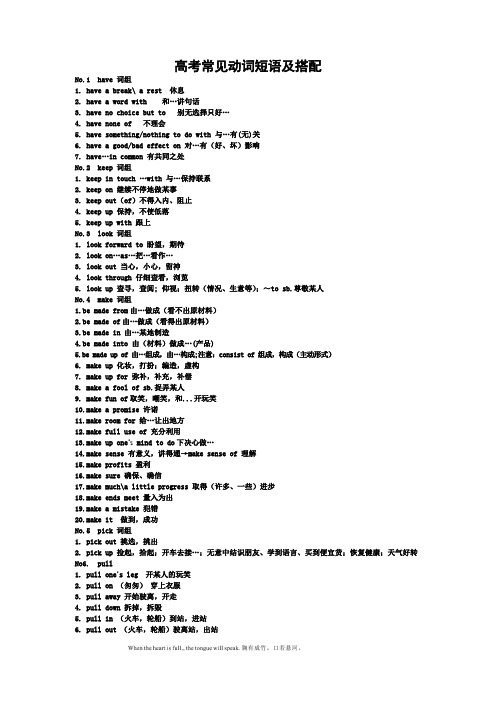
高考常见动词短语及搭配No.1 have 词组1. have a break\ a rest 休息2. have a word with 和…讲句话3. have no choice but to 别无选择只好…4. have none of 不理会5. have something/nothing to do with 与…有(无)关6. have a good/bad effect on 对…有(好、坏)影响7. have…in common 有共同之处No.2 keep 词组1. keep in touch …with 与…保持联系2. keep on 继续不停地做某事3. keep out(of)不得入内、阻止4. keep up 保持,不使低落5. keep up with 跟上No.3 look 词组1. look forward to 盼望,期待2. look on…as…把…看作…3. look out 当心,小心,留神4. look through 仔细查看,浏览5. look up 查寻,查阅; 仰视;扭转(情况、生意等);~to sb.尊敬某人No.4 make 词组1.be made from由…做成(看不出原材料)2.be made of由…做成(看得出原材料)3.be made in 由…某地制造4.be made into 由(材料)做成…(产品)5.be made up of 由…组成,由…构成;注意:consist of 组成,构成(主动形式)6. make up 化妆,打扮;编造,虚构7. make up for 弥补,补充,补偿8. make a fool of sb.捉弄某人9. make fun of取笑,嘲笑,和...开玩笑10.make a promise 许诺11.make room for 给…让出地方12.make full use of 充分利用13.make up one’s mind to do下决心做…14.make sense 有意义,讲得通→make sense of 理解15.make profits 盈利16.make sure 确保、确信17.make much\a little progress 取得(许多、一些)进步18.make ends meet 量入为出19.make a mistake 犯错20.make it 做到,成功No.5 pick 词组1. pick out 挑选,挑出2. pick up 捡起,拾起;开车去接…;无意中结识朋友、学到语言、买到便宜货;恢复健康;天气好转No6. pull1. pull one’s leg 开某人的玩笑2. pull on (匆匆)穿上衣服3. pull away 开始驶离,开走4. pull down 拆掉,拆毁5. pull in (火车,轮船)到站,进站6. pull out (火车,轮船)驶离站,出站7. pull oneself together 控制自己的感情No.7 put 词组1. put away放好,收拾起来;存放(钱)2. put down 扑灭,平息,镇压;写下,记下3. put off 延期,拖延4. put on 上演,穿戴5. put out 熄灭,扑灭6. put out 伸出,拿出7. put up 建造,搭起;挂起,张贴;举起,抬起8. put up with 忍受,容忍9. put one's heart into 全神贯注No.8 set 词组1. set fire to. 放火; → be on fire (状态)着火了2. set sb free 释放某人3. set an example to sb. 给某人树立榜样4. set about doing 着手,开始5. set off 起程,出发6. set out 出发,动身; set out to do 开始做....7. set up 创立,设立,建立No.9 turn 词组1. turn against 转而反对2. turn in 交进来,上缴,归还3. turn...into... 变成,转变成,翻译为4. turn off 关掉水、电、气、灯等;使...烦恼、不高兴5. turn on 打开6. turn over 把...翻过来;辗转反侧7. turn to 转向,找...求助9. turn up 把音量开大一些;发生,出现10.turn down 把音量开小声一些;拒绝,排斥No.10 take 词组1. take down 抄下,记下;2. take off 脱下,脱掉3. take off 脱掉(衣物、鞋帽),成名,(飞机)起飞4. take up 占去时间、空间;从事某项活动,发展某种爱好5. take a look at 看一看6. take a message for sb. 给某人捎个信7. take an aim at 瞄准8. take an active part in 积极参加9. take care of 照料10. take great trouble to do sth. 不辞辛劳地做...11. take hold of = catch hold of 抓住,控制住12. take it easy 不着急,别放在心上13. take on a new look 呈现新面貌14. take place 发生15. take one's place = take the place of sb. = replace sb. 代替某人16. take one's temperature 给...量体温17. take one's turn 按顺序18. take a photo\picture of sb. 给…拍照片19. take pride in= be proud of 自豪于,以…为荣20. take sb.\sth. by mistake 误以为…;把…认错21. take sth. for granted 认为…当然→take it for granted that…22. take the side of 支持…方No.11 call 词组1. call at 访问,拜访某地2. call for 请求,要求;(应约)去接某人3. call in 召请,请来,收回4. call on / upon 拜访某人;~sb. to do 号召某人…干5. call out 大声呼喊,叫喊6. call up 给…打电话;使人想起,回忆起;应征入伍No.12 come 词组1. come across 遇见,发现2. come on / along 来吧,快点3. come at 袭击,向…扑来4. come back 回来,回到…来5. come back to life\come back to one’s life 复活,苏醒过来6. come into use 使用起来come into being形成,产生come into power 掌权,执政come into effect 生效、起作用7. come out (花)开放;出版8. come to 来到,达到,结果是9. come up 走过来,走近/长出,发芽e upon 偶然碰上,遇到e off 脱落;分开No.13 do 词组1. do with sb. 处理,处置;与某人相处2. do harm to 对…有害;do good to 对…、有益3. do well in 在…方面做得不错4. do wrong (to sb.)做坏事,做错事、冤枉5. do one’s best =try one’s best 尽力6. do a good deed 做一件好事7. do 起作用,奏效eg. The medicine did after 2 hours. 药两小时后起作用。
初中的归纳与解析常见的短语动词及其用法解析
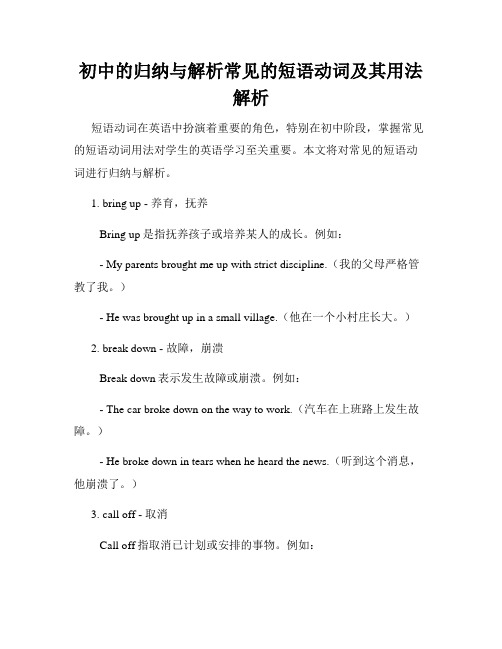
初中的归纳与解析常见的短语动词及其用法解析短语动词在英语中扮演着重要的角色,特别在初中阶段,掌握常见的短语动词用法对学生的英语学习至关重要。
本文将对常见的短语动词进行归纳与解析。
1. bring up - 养育,抚养Bring up是指抚养孩子或培养某人的成长。
例如:- My parents brought me up with strict discipline.(我的父母严格管教了我。
)- He was brought up in a small village.(他在一个小村庄长大。
)2. break down - 故障,崩溃Break down表示发生故障或崩溃。
例如:- The car broke down on the way to work.(汽车在上班路上发生故障。
)- He broke down in tears when he heard the news.(听到这个消息,他崩溃了。
)3. call off - 取消Call off指取消已计划或安排的事物。
例如:- They called off the meeting due to bad weather.(因为天气原因,他们取消了会议。
)- The football match was called off because of the heavy rain.(由于大雨,足球比赛被取消。
)4. come across - 偶然遇到Come across表示偶然遇到某人或某事。
例如:- I came across an old friend at the supermarket.(我在超市偶然遇到了一个老朋友。
)- He came across an interesting book while cleaning the attic.(在清理阁楼时,他偶然发现了一本有趣的书。
)5. get along with - 与...相处融洽Get along with表示与某人相处融洽。
所有动词总结
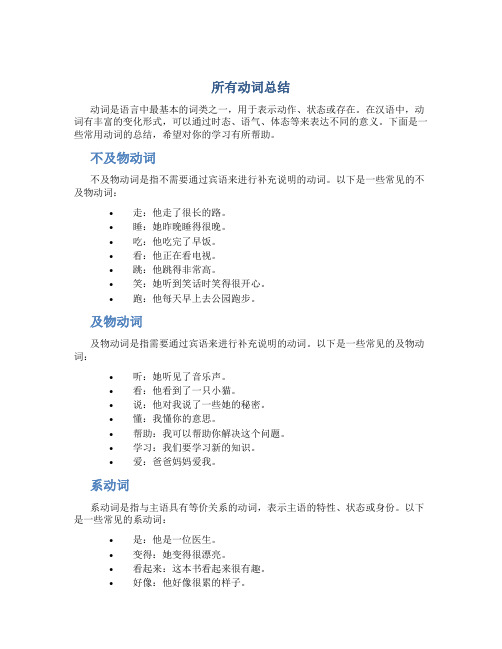
所有动词总结动词是语言中最基本的词类之一,用于表示动作、状态或存在。
在汉语中,动词有丰富的变化形式,可以通过时态、语气、体态等来表达不同的意义。
下面是一些常用动词的总结,希望对你的学习有所帮助。
不及物动词不及物动词是指不需要通过宾语来进行补充说明的动词。
以下是一些常见的不及物动词:•走:他走了很长的路。
•睡:她昨晚睡得很晚。
•吃:他吃完了早饭。
•看:他正在看电视。
•跳:他跳得非常高。
•笑:她听到笑话时笑得很开心。
•跑:他每天早上去公园跑步。
及物动词及物动词是指需要通过宾语来进行补充说明的动词。
以下是一些常见的及物动词:•听:她听见了音乐声。
•看:他看到了一只小猫。
•说:他对我说了一些她的秘密。
•懂:我懂你的意思。
•帮助:我可以帮助你解决这个问题。
•学习:我们要学习新的知识。
•爱:爸爸妈妈爱我。
系动词系动词是指与主语具有等价关系的动词,表示主语的特性、状态或身份。
以下是一些常见的系动词:•是:他是一位医生。
•变得:她变得很漂亮。
•看起来:这本书看起来很有趣。
•好像:他好像很累的样子。
•成为:她成为一名优秀的演员。
情态动词情态动词是用来表示说话者的意愿、能力、推测等情态的动词。
以下是一些常见的情态动词:•能:我能帮助你完成这个任务。
•必须:你必须按时交作业。
•应该:你应该好好休息。
•会:他会弹钢琴。
•可以:你可以选择任何一家餐厅。
动词短语除了单个动词外,动词短语也是汉语中常见的表达方式。
动词短语由动词和其他成分组成,能够更准确地描述动作或状态。
以下是一些常见的动词短语:•开车:他每天开车上班。
•吃饭:我们一起去吃饭吧。
•看电影:他喜欢看电影。
•上学:他每天早上都要去上学。
•去旅行:他计划去旅行一个月。
以上仅是一些常见的动词总结,希望能够帮助到你。
动词是语言中非常重要的一部分,通过掌握不同的动词及其用法,可以使我们的语言更加丰富和准确。
在学习过程中,不仅要掌握动词的基本意义,还要学会根据语境理解其更具体的含义。
高中英语语法:动词和动词短语(共43张PPT)

一、动词
(2)表示感官的连系动词。这类动词主要有feel, smell, sound, taste等,它们没有被动语态。 This kind of cake tastes delicious.这种蛋糕尝起来很美味。 That sounds great.听起来妙极了。 (3)表示变化的连系动词。这类连系动词比较多,常见的有 become, grow, turn, fall, get, go, come, run等,主要用来表示主语 变化成什么情况。 Even quiet and serious scholars can become excited about it.甚至沉默 严肃的学者也能因其而激动。 The maple leaves turn red in autumn.枫叶在秋天变红了。
一、动词
高频考点: 表示“变成什么样子的人”常用become和turn,但是turn后作表 语的名词前不用冠词。 He wanted to become a writer but he turned journalist.他想成为一名 作家,但却成了一个记者。 (4)表示表象的连系动词。这类词主要有seem,appear,look等。 She used to smile all the time but now she looks washed out and unhappy.过去的她笑口常开,而现在的她看上去却缺乏活力,很不 开心。 He seemed disappointed when he was refused.被拒绝后他看起来很 失望。
一、动词
(5)表示终止的连系动词。这类词主要有prove, turn out等。 I imagined it would prove an easy task.我以为这会是一项容易的任务。 The medicine turned out highly effective.该药疗效显著。 (6)表示持续的连系动词。这类词主要有remain, keep, stay等。 He always keeps silent at the meeting.开会时他总是保持沉默。 3.助动词 助动词不能独立作谓语,必须和动词原形或分词构成复合谓语,表示实义 动词的时态、语态、语气、人称和数等。 (1)助动词be可以和过去分词构成被动语态,或与现在分词构成各种进行 时态。 History is made by the people.历史是人民创造的。 She is doing her homework now.她正在做家庭作业。
英语系动词详细用法汇总

英语系动词详细用法汇总
英语中的动词有很多种用法,下面是一些常见的动词用法汇总:
1. 及物动词:动作作用于一个宾语,例如:eat(吃)、drink (喝)、write(写)等。
2. 不及物动词:动作不作用于一个宾语,例如:run(跑)、sleep (睡觉)、cry(哭)等。
3. 双宾语动词:有两个宾语的动词,一个是直接宾语,一个是间接
宾语,例如:give(给)。
4. 及物动词+介词:及物动词后面跟一个介词短语作为宾语,例如:look at(看)、listen to(听)等。
5. 不定式动词:以to+动词原形构成,表示目的、意图或目标,例如:want to go(想去)、try to do(尝试做)等。
6. 动词 + -ing形式:表示正在进行的动作,例如:I am reading (我正在读书)。
7. 动词 + 分词形式:表示被动语态,例如:The book is written by him(这本书是他写的)。
8. 动词 + 副词/介词短语:表示动作的方式、时间、地点等,例如:run quickly(快速跑)、go to school(去学校)等。
9. 动词 + 名词:表示动作的对象或结果,例如:drink water(喝水)、play football(踢足球)等。
10. 动词的时态变化:包括一般现在时(present simple)、一般过去时(past simple)、现在进行时(present continuous)、过去进行时(past continuous)等。
动词及动词短语(17张PPT)初中英语专项复习课件

动
词
的
第 ①一般动词在词尾加-s。如:look-looks; get-gets
基
动 词 和
动本 词
形
三 ②以s, x, sh, ch结尾加-es。如:address-addresses; box-boxes; finish人 finishes; touch-touches
动
称 ③以"辅音字母+y"结尾的词,变y为i加-es。如:study-studies
动词
中考主要是在语境中对动词进行考查,常见命题角度: (1)实义动词辨析。 中考选择填空和完形填空中都常涉及对实义动词辨析的考查,做题时: ✓ 首先要明确动词的含义; ✓ 然后通过分析语境找出关键词,或根据前后的逻辑关系确定答案。
动词
常考的几组近义动词: ①divide与separate ②hear, listen与sound ③invent, discover, create与find ④cost, spend, pay与take
规 则 变 化
过去分词
不规则变 化
动
词
的
基
动 词 和 动 词
动本 词
形 式
①一般动词在词尾加-ing:go-going; look-looking ②以不发音的e结尾的词,去e加-ing:come-coming; use-using 现 ③以辅音字母结尾的重读闭音节词,双写该辅音字母加-ing:begin在
类
sound, seem, feel, stay, turn, get, keep, remain
助动词 没有词义,不能单独作谓语:be, do/does/did, have/has/had, will, shall
动词的各种分类及用法

一:动词分类1.按语法功能类别意义常见例词例句实义动词含有实在的意义,表示动作或状态,在句子中能独立作谓语。
有4种变化形式:三单,现在分词,过去式,过去分词。
Study,learn,enjoy等She has some bananas. 她吃些香蕉。
They eat a lot of potatoes. 他们常吃土豆。
I’m reading an English book now.我现在正看一本英文书。
连系动词本身有一定的词义,但不能独立作谓语,必须和表语一起构成谓语。
用法:连系动词+形容词系动词: 1.be seemappear turn2.look sound tastesmell feel 感官类3.get turn growbecome go 变化类4.stay remain keepcontinue维持类His father is a teacher.他父亲是教师。
Twins usually look the same.双胞胎通常看起来一样。
The teacher became very angry. 老师变得很生气。
助动词本身没有词义,不能独立作谓语,只能和主要动词一起构成谓语动词,用来表示否定、疑问、时态、语态或其它语法形式,助动词自身有人称、单复数和时态的变化。
be,have,do,will,shallHe doesn’t speak English. 他不说英语。
We a re playing basketball. 我们在打篮球。
Do you have a brother? 你有兄弟吗?情态动词本身有一定的意义,不能独立作谓语,只能和实意动词一起构成谓语动词,表示说话人的语气和情态。
情态动词没有人称和单复数的变化,有些情态动词有过去式。
can, may, must,need, have to,will, should,wouldYou can keep the books for two weeks.这些书你可以借两个星期。
动词归纳总结

动词归纳总结动词是语言中最基本的词类之一,用于表达一个人、事物或状态的行为、动作或状态变化。
在英语中,动词的形态和用法较为复杂,有不同的时态、语态和各种动词形式。
本文将对常见的动词进行归纳和总结,帮助读者加深对动词的理解和应用。
一、动词的分类根据词义和用法的不同,动词可以分为以下几类:1. 实义动词(Main Verbs):表示具体的行为、动作或状态。
例如:- eat(吃)- run(跑)- sleep(睡觉)2. 系动词(Linking Verbs):用于连接主语和表语,表示主语的状态、特征或属性。
例如:- be(是)- become(变得)- seem(似乎)3. 助动词(Auxiliary Verbs):用于构成各种时态、语态和情态的动词。
例如:- have(已经)- do(做)- can(能够)4. 情态动词(Modal Verbs):用于表示可能性、必要性、习惯性等情态的动词。
例如:- may(可能)- must(必须)- can(能够)二、动词的时态和语态1. 时态(Tense):表示动作的时间。
常见的时态有以下几种:- 一般现在时(Simple Present Tense):用于描述经常发生的动作、客观真理或现在的状态。
例句:- I eat breakfast every morning.(我每天早上吃早餐。
)- The sun rises in the east.(太阳从东方升起。
)- 现在进行时(Present Continuous Tense):用于表示现在正在进行的动作。
例句:- She is studying for her exam.(她正在为考试而学习。
)- They are playing soccer in the park.(他们正在公园踢足球。
)- 一般过去时(Simple Past Tense):用于表示在过去某个时间发生的动作或状态。
例句:- He walked to school yesterday.(他昨天走路去学校。
动词归纳总结
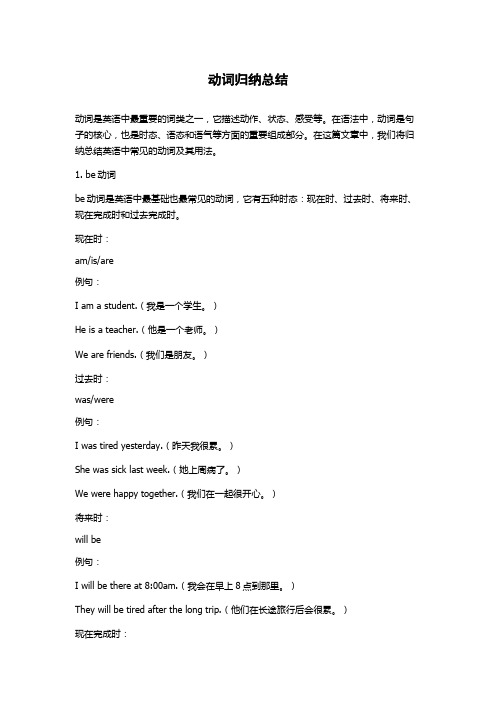
动词归纳总结动词是英语中最重要的词类之一,它描述动作、状态、感受等。
在语法中,动词是句子的核心,也是时态、语态和语气等方面的重要组成部分。
在这篇文章中,我们将归纳总结英语中常见的动词及其用法。
1. be动词be动词是英语中最基础也最常见的动词,它有五种时态:现在时、过去时、将来时、现在完成时和过去完成时。
现在时:am/is/are例句:I am a student.(我是一个学生。
)He is a teacher.(他是一个老师。
)We are friends.(我们是朋友。
)过去时:was/were例句:I was tired yesterday.(昨天我很累。
)She was sick last week.(她上周病了。
)We were happy together.(我们在一起很开心。
)将来时:will be例句:I will be there at 8:00am.(我会在早上8点到那里。
)They will be tired after the long trip.(他们在长途旅行后会很累。
)现在完成时:have/has been例句:I have been to New York.(我去过纽约。
)He has been studying for 2 hours.(他已经学习了两个小时。
)过去完成时:had been例句:I had been working in a company for 5 years before I quit.(我在一家公司工作了五年,然后辞职了。
)2. 行为动词行为动词通常表示行为或动作,如walk、run、eat等。
例句:She walks to work every day.(她每天步行去上班。
)The children are running in the park.(孩子们在公园里奔跑。
)We are eating breakfast now.(我们现在在吃早餐。
动词的基本用法

动词的基本用法动词是语言中最基本的词类之一,它在句子中担任着非常重要的角色。
本文将介绍动词的基本用法,包括时态、语态、情态动词以及常见的动词短语。
一、时态1. 现在时:表示目前正在进行或经常发生的动作。
例如,“I eat an apple every day.”(我每天吃一个苹果。
)2. 过去时:表示过去某个时间发生的动作。
例如,“He played football yesterday.”(他昨天踢足球。
)3. 将来时:表示将来某个时间会发生的动作。
例如,“We will go to the park tomorrow.”(我们明天会去公园。
)4. 完成时:表示过去某个时间已经完成的动作。
例如,“She has finished her homework.”(她已经完成了她的家庭作业。
)5. 进行时:表示正在进行的动作。
例如,“They are watching a movie now.”(他们正在看电影。
)二、语态1. 主动语态:表示主语是动作的执行者。
例如,“The boy kicked the ball.”(男孩踢了足球。
)2. 被动语态:表示主语是动作的承受者。
例如,“The ball was kicked by the boy.”(足球被男孩踢了。
)三、情态动词情态动词是一类辅助动词,用于表示能力、意愿、推测等情态或语气。
常见的情态动词包括can、could、may、might、will、would、shall、should、must等。
1. 能力:- can表示能力或许可。
例如,“I can swim.”(我会游泳。
)- could表示过去的能力。
例如,“When I was young, I could climb trees.”(当我年轻的时候,我会爬树。
)2. 意愿:- will表示意愿、决心或承诺。
例如,“I will help you with your homework.”(我会帮你做作业的。
小学的归纳常见动词短语的意思和用法解析

小学的归纳常见动词短语的意思和用法解析动词短语是由一个动词及其后面的小品词、介词短语或副词形成的短语。
在英语学习中,积累和掌握常见的动词短语对于提高语言表达能力和理解能力至关重要。
本文将归纳、解析小学阶段常见的动词短语,旨在帮助学生更好地掌握这些短语的意思和用法。
1. Look after意思:照料,照顾例句:My sister looks after me when my parents are at work.(父母上班的时候,妹妹照顾我。
)用法解析:Look after 后面通常接名词或代词作宾语,表示照料某人或某物的需要。
2. Take care of意思:照顾,保护例句:Please take care of your little brother while I'm out.(我出去一会,请你照顾好你弟弟。
)用法解析:Take care of 在句中作短语动词,后面可以接名词或代词作宾语,表示照顾或保护某人或某物。
3. Put on意思:穿上,戴上例句:Don't forget to put on your coat before going outside.(出去之前别忘记穿上外套。
)用法解析:Put on 表示穿上或戴上衣物、饰品等,后面接名词作宾语。
4. Get up意思:起床例句:I get up early every morning to catch the school bus.(我每天早起赶校车。
)用法解析:Get up 是表示起床的常用短语,后面不需要接宾语。
5. Go to bed意思:上床睡觉例句:It's time to go to bed. You have school tomorrow.(该睡觉了,明天还要上学。
)用法解析:Go to bed 表示上床睡觉,后面不需要接宾语。
6. Put away意思:收起,放好例句:After playing with toys, remember to put them away.(玩具玩完之后,记得将它们收起来。
小学六年级重点知识常见动词短语的用法总结

小学六年级重点知识常见动词短语的用法总结动词短语在英语语法中起着重要的作用。
在小学六年级的学习中,学生们需要掌握并灵活运用常见的动词短语。
下面将总结一些常见的动词短语及其用法,以帮助学生们更好地掌握这些知识。
一、形容事物的动词短语1. Look after意为“照看/照顾”,用于描述照料或照顾某人或某物。
例如:- My sister looks after me when my parents are not at home.(当我父母不在家时,我姐姐照顾我。
)2. Take care of意为“照顾/照料”,与"look after"意思相近,可用于描述照料或照顾某人或某物。
例如:- We should take care of our pets and feed them regularly.(我们应该照顾好我们的宠物并定期给它们喂食。
)3. Make up意为“和解/弥补”,可用于描述在冲突后做出和解或弥补的行为。
例如:- Jenny and Nancy had an argument, but they quickly made up with each other.(珍妮和南希发生了争执,但他们很快就和好了。
)二、时间、频率和顺序相关的动词短语1. Get up意为“起床”,用于描述早上离开床铺的行为。
例如:- I usually get up at 7 o'clock in the morning.(我通常在早上7点起床。
)2. Go to bed意为“上床睡觉”,用于描述晚上进入睡眠的行为。
例如:- It's late. You should go to bed now.(已经很晚了,你应该去睡觉了。
)3. Have breakfast/lunch/dinner意为“吃早餐/午餐/晚餐”,用于描述进食的行为。
例如:- I usually have breakfast at 8:00 am.(我通常在早上8点吃早餐。
常用英语动词用法

常用英语动词用法英语动词是英语语言中最重要的词类之一,它们的用法灵活多样,掌握好动词的用法对于学好英语至关重要。
在这篇文章中,我们将探讨一些常用英语动词的常见用法。
一、Be 动词(am/is/are)Be 动词是英语中最基本的动词之一,用于表示“是”的概念。
1、 am 用于第一人称单数 I 之后,例如:I am a student (我是一名学生。
)2、 is 用于第三人称单数 he/she/it 之后,比如:He is a doctor (他是一名医生。
)She is very beautiful (她非常漂亮。
)It is a dog (它是一只狗。
)3、 are 用于第二人称 you 以及复数主语之后,像:You are my friend (你是我的朋友。
)We are happy (我们很开心。
)They are teachers (他们是老师。
)Be 动词还可以与现在分词构成进行时态,表示正在进行的动作,例如:I am reading a book (我正在读一本书。
)He is playing football (他正在踢足球。
)二、Have 动词Have 有“有;拥有”的意思,其用法如下:1、当主语是第三人称单数时,要用has,其余人称用have。
例如:I have a pen (我有一支笔。
)She has a car (她有一辆车。
)2、 have/has 还可以与过去分词构成完成时态,比如:I have finished my homework (我已经完成了我的作业。
)He has been to Beijing (他去过北京。
)三、Do 动词Do 主要用于构成疑问句和否定句,以及在一些特定的短语中使用。
1、构成疑问句:Do you like apples? (你喜欢苹果吗?)Does hego to school by bike? (他骑自行车上学吗?)2、构成否定句:I don't know (我不知道。
高考英语常考动词与动词短语总结
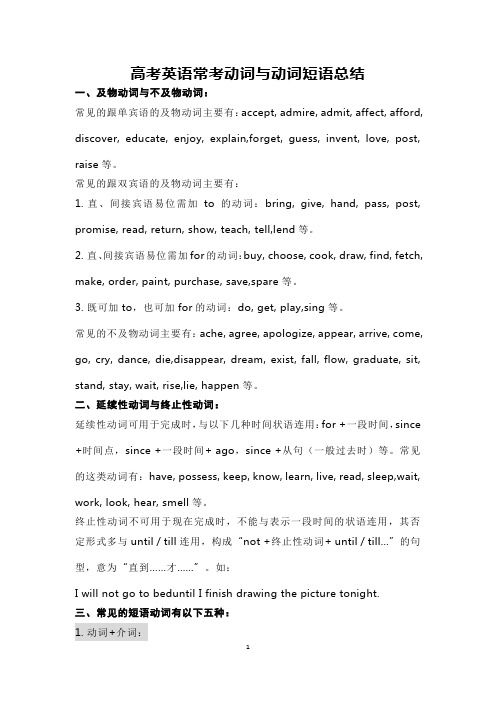
高考英语常考动词与动词短语总结一、及物动词与不及物动词:常见的跟单宾语的及物动词主要有:accept, admire, admit, affect, afford, discover, educate, enjoy, explain,forget, guess, invent, love, post, raise等。
常见的跟双宾语的及物动词主要有:1. 直、间接宾语易位需加to的动词:bring, give, hand, pass, post, promise, read, return, show, teach, tell,lend等。
2. 直、间接宾语易位需加for的动词:buy, choose, cook, draw, find, fetch, make, order, paint, purchase, save,spare等。
3. 既可加to,也可加for的动词:do, get, play,sing等。
常见的不及物动词主要有:ache, agree, apologize, appear, arrive, come, go, cry, dance, die,disappear, dream, exist, fall, flow, graduate, sit, stand, stay, wait, rise,lie, happen等。
二、延续性动词与终止性动词:延续性动词可用于完成时,与以下几种时间状语连用:for +一段时间,since +时间点,since +一段时间+ ago,since +从句(一般过去时)等。
常见的这类动词有:have, possess, keep, know, learn, live, read, sleep,wait, work, look, hear, smell等。
终止性动词不可用于现在完成时,不能与表示一段时间的状语连用,其否定形式多与until / till连用,构成“not +终止性动词+ until / till...”的句型,意为“直到……才……”。
六年级英语知识点动词短语
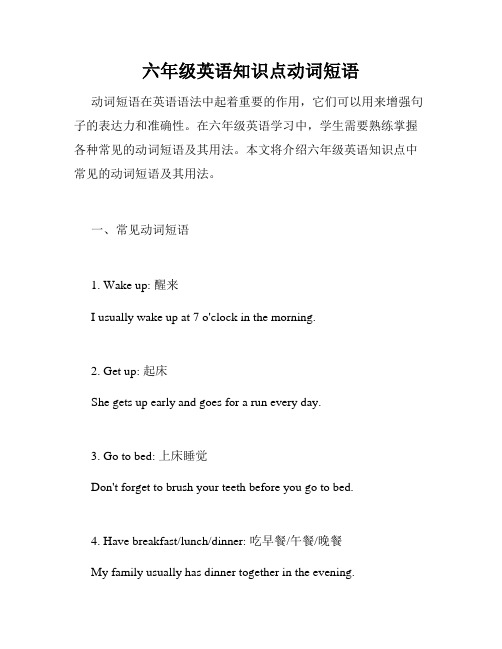
六年级英语知识点动词短语动词短语在英语语法中起着重要的作用,它们可以用来增强句子的表达力和准确性。
在六年级英语学习中,学生需要熟练掌握各种常见的动词短语及其用法。
本文将介绍六年级英语知识点中常见的动词短语及其用法。
一、常见动词短语1. Wake up: 醒来I usually wake up at 7 o'clock in the morning.2. Get up: 起床She gets up early and goes for a run every day.3. Go to bed: 上床睡觉Don't forget to brush your teeth before you go to bed.4. Have breakfast/lunch/dinner: 吃早餐/午餐/晚餐My family usually has dinner together in the evening.5. Brush teeth: 刷牙Remember to brush your teeth twice a day.6. Wash face: 洗脸She washes her face with cold water every morning.7. Take a shower: 淋浴I always take a shower before going to bed.8. Go to school: 去上学We need to catch the bus to go to school.9. Do homework: 做作业He spends two hours every day doing his homework.10. Play sports: 进行体育运动They like to play sports in the park on the weekends.11. Watch TV: 看电视She watches TV for an hour every evening.12. Listen to music: 听音乐I like to listen to music while doing my homework.13. Read books: 读书He reads books in the library every Saturday.14. Write a letter: 写信We wrote a letter to our pen pals last week.15. Use a computer: 使用电脑He uses a computer to search for information online.二、动词短语的用法1. 用于描述日常活动动词短语常用于描述日常活动,表示人们的习惯或常规动作。
- 1、下载文档前请自行甄别文档内容的完整性,平台不提供额外的编辑、内容补充、找答案等附加服务。
- 2、"仅部分预览"的文档,不可在线预览部分如存在完整性等问题,可反馈申请退款(可完整预览的文档不适用该条件!)。
- 3、如文档侵犯您的权益,请联系客服反馈,我们会尽快为您处理(人工客服工作时间:9:00-18:30)。
2014全国高考题常见动词及动词短语用法动词短语是高考必考题,在平时的学习中要把同种类型的短语放在一起比较,如同一个动词+不同的介词/副词;同一个介词/副词+不同的动词。
诸如此类的固定短语,属于最基本的知识,如果学生有错误,则应该加强背诵并平时多解题,进而加以巩固.动词短语look up 查找,抬头看;look into调查,研究;look back on回顾;回忆;look through 仔细检查;看穿;表示“学会”用pick up; pick up另外还有“捡起; 顺车接送,搭载;收拾, 整理;重新开始;生意或身体转好,获得”等义;bring up 表示“抚养, 教育;提出;呕吐”;look up 表示“向上看;(形势)好转, 改善;查阅”;set up表示“建立, 设置;造成, 产生”。
动词短语turn up出现,调高;turn down调低或拒绝;leave off停止;move on继续前进;get away离开,脱身,逃掉get across(to sb.)使(某事)传播或为人理解;get through到达;与某人(通过电话)联系;get through(to sth.)进入下一段比赛;get through(to sb.)与人沟通;get (sth.)in收集/收获某物;动词短语go back on背弃,违约;回到;take away from夺走,剥夺;make up for弥补…;补偿…;catch up with追上,赶上;keep up with 跟上”make the best/the most/good use/full use of充分利用,尽量好好去做;get away from逃离;keep an eye on照看,,留心; 注意;catch sight of看见,发现;get hold of得到,掌握;take charge of负责take the charge of由……负责make mention of提到词义辨析develop发展,establish建立,成立;observe观察,庆祝,遵守revise修订,修正turn to sb for help/advice 转向,向。
求助,求教;do without“不用……勉强度过”eat up “吃完”, give away “收拾”“赠送”, deal with “应付, 处理”。
Cope with处理Chase追求,追逐;register登记,注册;offer提供;Pay back偿还;报复;报答;偿付;pay off付清;(付清工资后)解雇;(努力)得到回报;put away收拾,整理,放在一边,不管不顾;put off推迟put out扑灭Remember记得;remind提醒,使…想起…;recover康复;recall回忆do away with废除,消灭;live up to符合,不辜负;”come up with想出, 提出;put up with 忍受, 容忍;stick to坚持,紧跟,粘住,忠于Convince使…相信,使…信服;I’m convinced that…..我相信。
inform通知;guarantee保证,担保;refuse拒绝;Set off出发,开始;点燃;set out to do/set about doing着手,开始set up建立,成立,设立;set down写下,记下固定搭配attach sth to sth把…依附到…之上;attach importance to重视…动词短语make up化妆,编造,弥补,组成;use up用完,耗尽;break down机器出故障;身体垮掉;分解;划分动词share分享,共同拥有;realize意识到,实现;ignore忽视,不理睬;cause导致动词prove证明,结果是…;imply涉及…;demand要求,命令;predict预测;预见Turn off关闭;turn in上交;break down:(机械)抛锚;(人的精神)垮掉;settle down:定居;calm down:冷静下来go on继续;hold on抓住不放;坚持;move on 继续前进;carry on继续进行高中英语带有to、out、off、away的短语tobe/get/become used to 习惯于be related to与…有关系be addicted to 沉溺于;对…上瘾be opposed to反对devote oneself to献身于;专心于be devoted to 致力于;忠诚于be admitted to 被…录取;准进入be attached to附属于;喜欢;依恋be adjusted to适应be known to为…所知be married to和…结婚be sentenced to被判处be connected to和…连在一起be exposed to暴露于;遭受be compared to 被比喻成compare…to…把…比作…be/become/ get accustomed to习惯于;有…习惯be engaged to 与…订婚get down to 着手做lead to 导致object to反对;不喜欢;不赞成put one’s mind to全神贯注于give rise to 引起look forward to盼望pay attention to注意stick to坚持attend to 专心;注意;照料;see to负责;注意contribute to对…作贡献;有助于make contributions to对…作贡献apply oneself to 致力于come close to几乎;将近reply to 回答add to 增加add up to加起来in addition to除…之外turn to转向; 求助于look up to 尊敬belong to 属于respond to 回答;对…作出回应accustom oneself to 使自己习惯于amount to等于set an example to 给…树立榜样refer to 谈到;参考;查阅prefer…to…更喜欢agree to sth. 同意某事(比较:agree to do sth.同意做某事)join…to…把…和…连接起来turn a blind eye to对…视而不见turn a deaf ear to 对…充耳不闻show honour to向…表示敬意put an end to(bring…to an end) 结束drink (a toast) to 为……干杯set fire to 放火烧……happen to…发生了……事occur to sb. 想起;想到total up to 总计达be close to 几乎;将近help oneself to 随便用……hold on to抓住;固守do harm to 对……有害处do wrong to 冤枉某人date back to 追溯到come to 来到;达到;结果为(比较:come to do sth逐渐做某事)when it comes to…谈到……时treat sb. to sth. 请某人吃……pay a visit to参观……the key to……的答案access to 进入;取得的方法on one’s way to 在去某处的路上;在达成某事的过程中be a stranger to不习惯;对……陌生be kind to 对……和善be important to 对……重要be senior to年龄长于……be junior to年龄小于……be equal to和……相等be particular to ……所特有的(比较:be particular about 对……过于讲究;挑剔)be familiar to 为……熟悉be similar to 和……相似be open to 对……开放be loyal to 对……忠诚be helpful to对……有益处be useful to 对……有用be good to sb对某人好(比较:be good for 对……有益处) be bad to 对……不好be bad for(比较:对……有害处)be new to 对……不习惯;对……陌生next to(否定词前)几乎;next to ……的旁边due to 由于;归因于……be due to do sth.预定要做某事owing to 由于;因……的缘故thanks to 多亏了;由于as to 关于;至于in/with relation to 关于;就……而论according to 根据offbadly off 贫穷well off 富裕be off离开take off[飞机等]起飞;事业腾飞,脱下put off 推延[时间]hurry off匆忙离开... turn off关掉...get off下车have /take/ask for a day off请假/离开一天out○1go all out竭尽全力○2be out of employment失业○3be out of style不合时代,不时髦○4 burst out laughing突然笑起来○5come out with发表,提出;公布○7fall out of放弃(习惯等)○8 get out of逃避;摆脱;改掉help sb. out帮助,帮忙○13in and out进进出出○14○15keep out of躲开,(使)置身...之外○16out of debt 不欠债○17out of favour 失宠;不受欢迎○18out of question 毫无疑问○21run out of 用完,耗尽○22search out 寻找,找到○24take out loans 借贷○26turn out 关掉(收音机等)○27watch out for 密切注意;戒备,提防○28weep out 边哭边说出○29year in year out 年复一年地,不断地○30out of repair 失修○31set out to do sth .开始做某事○32put out a fire 灭火 ○33be out of prison 出狱○34 be out of condition 身体情况不好,健康欠佳 away◇1take away 消除,消耗○2run away 流失,逃跑○3give away 泄露,分送○4get away 逃脱,离开○5throw away 扔掉○6put away 把……收起来放好○7clear away 扫除,收拾○8pass away 去世,逝世○9far away 很远,遥远○11far away from 远离 drive away (汽车)离开○14 burn away 燃烧没了 ○15take... away 拿开,拿走 give... away 赠送;分发○17 keep away from 避开,不接近,离...远远的 ○18break away from 打破,脱离,挣脱,改掉○19be away from 远离 ○20stay away from 远离... ○21smooth away difficulties 克服困难 ○23give oneself away 泄露,露马脚○26rub away 擦掉;磨去○29weep away 在哭泣中度过 Uplook up 查找dress up 化妆,打扮;穿上盛装put up 张贴;搭建set up 成立,建立,创建 roll up 卷起(袖子)mix up (把...)混合,搅拌ring up 给...打电话call up 给...打电话 end up=finish 结束,完成cheer up 使振奋,使开心clean up 打扫,清理open up 打开,开拓(视野)cut up 切碎use up=run out of 用完,用光climb up 爬上(树)eat up 吃完,吃光make up 编造(一个对话)take up 占(百分之多少)think up 想起,想出show up 出席,露面give up 放弃fix up 修理shut up 闭嘴hand up 举起手来stand up 站立,站起来,起立turn up(把电器、声音等)调大bring up 培养;把...带大wrap up 把...包好wake up 醒来;唤醒keep up 保持,维持(=keep)speed up 加速join up 联合起来;把...联结起来pick up 捡起,拾起;开车去接...hold up 阻挡,使停顿get up 起床;站起来stay/sit up 熬夜,不睡觉hang up 挂断电话(反义:hold on)build up 逐步建立;加强divide up 分配break up 分裂,分解grow up 成长,长大clear up (天气)放晴;整理,收拾(=put away)hurry up 快一点,赶快catch up with 追上,赶上make up one's mind to do sth 下定决心做某事put up with 忍受,容忍add up to (加起来)总共达come up with=think up 想起,想出put up one's hand 举起手来up and down 上上下下Time is up.时间到了。
